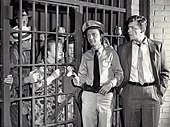 |
| Deputy Barney Fife arrests Aunt Bee |
That is why an arrest in itself is not a significant factor in whether criminal charges will actually be pursued by the prosecutors at the State Attorney's Office. The way to think of the officers and deputies of the Clearwater Police Department and the Pinellas County Sheriff's Department or other police departments is that their investigations act as the initial filters in criminal cases. They must decide if a crime has been committed and if so whether an arrest will be made. Factors which result in an arrest by local law enforcement include the severity of the alleged offense, whether the crime was violent and whether the defendant is likely to flee.
Yet in practice every felony will eventually result in an arrest tho the arrest may be postponed to an agreed upon time after negotiations for a system walk thru with fingerprinting and the posting of an appropriate bond under certain circumstances. Law enforcement may choose not to arrest immediately but to proceed based on an arrest warrant, then it's important to learn how to turn yourself in on an arrest warrant without spending time in jail. Most misdemeanors need not result in an arrest unless. However, officers in Florida must make an arrest when called to battery domestic violent cases, DUI or driving while license suspended or revoked for public safety reasons.
Once the police have made a decision to arrest, then the State Attorney's Office makes a decision as to whether to file the case. Just as important a decision must be made as to how to file the case, should a felony be reduced to a misdemeanor even if it is filed? If the state elects to no file the case it acts as a unilateral dismissal not requiring permission from any Court. A notice of the dismissal is simply filed with the clerk of court and posted into the file.
The criteria used by the prosecutor to file is twofold. First, can the criminal case be won at trial. Second, is filing the charge just. As you can imagine a skillful defense lawyer will bring every possible argument in persuading the prosecutor not only that the case can not be won at trial but that justice demands that the case be no filed.
